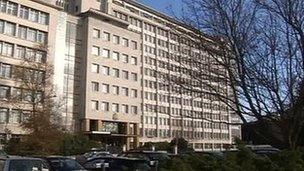Minister had concerns over DARD Ballykelly move
- Published

The Department of Agriculture is leaving its headquarters at Dundonald House in east Belfast.
NI's finance minister had concerns about a decision to relocate the agriculture department to a former army base in the north west, it has emerged.
Some 800 jobs will move from Belfast to the former Shackleton Army barracks in Ballykelly.
Sammy Wilson's concerns came to light after an investigation by BBC Northern Ireland's The View.
But Agriculture Minister Michelle O'Neill said she was content with her decision.
It is the latest twist in the executive's pledge to transfer civil service jobs west in a bid to redress an historic imbalance in investment, with government departments largely based in the greater Belfast area.
The View found Mr Wilson was asked to approve a decision by the agriculture minister to over-rule advice from her permanent secretary and opt for Ballykelly, without further appraising other potential sites.
Ms O'Neill's "ministerial direction" had to be approved by the finance minister.
But it has emerged he, too, had concerns and, because the decision affected other departments, he brought the matter to the executive.
It is understood Mr Wilson's concerns included the cost, staffing consideration and access to the former barracks site.
However, in an interview with The View, Ms O'Neill said the Ballykelly site was ideal, was already owned by the executive and would regenerate the area.

Agriculture Minister Michelle O'Neill said she is content with her decision.
She said she was content with the process, which included an assessment of local council areas. Limavady, near Ballykelly, came second in an internal departmental audit, just behind Strabane.
She said the executive had approved her decision to seek a business appraisal for Ballykelly.
"At the end of the day you would have wasted a lot of time going through all areas where the location was never going to happen so this was just a logical step for me," she said.
What about the finance minister's concerns?
"I think I followed process," said Ms O'Neill. "He (Mr Wilson) had voiced concerns. But that's ok. I'm content with the approach I've taken. I think it is a reasonable approach. I stand over it."
Ms O'Neill said she hopes the trade union, NIPSA, which is seeking legal advice on the decision, will accept her explanation about why she opted for Ballykelly, before she began her Equality Impact Assessment.
NIPSA has not yet ruled out a Judicial Review.
Ballykelly is now in line for a multi-million pound investment, a boon for an area that has suffered a series of economic blows in recent years.
Tina McCloskey, from Ballykelly Community Centre, said the closure of the army camp had been a really big blow for Ballykelly.
She added: "Bringing these jobs and bringing these people here to Ballykelly and maybe people using the services in Ballykelly would be a good thing for us."
'Gifted'
Mrs McCloskey is among those pressing the Office of First and Deputy First Minister (OFMDFM) for a new community centre on the Ballykelly site which would provide services such as creche and catering facilities for workers.
OFMDFM acquired the land from the Ministry of Defence in 2011 in another controversial decision.
The MoD "gifted" the land to the executive but it came with a price tag, as it comes with millions of pounds in maintenance and clean-up costs.
The site is partly on reclaimed land that is prone to flooding and some of it is contaminated with lead and other pollutants.
Because of the costs, the OFMDFM accounting officer advised ministers it did not represent value for money.
This led to a "ministerial direction" being issued by Peter Robinson and Martin McGuinness.
John Dallat, who supported jobs coming to Ballykelly in his rural constituency, still has concerns about this initial decision.
Commenting on the ministerial direction, he pointed out it is not done very often and only occurs where a senior civil servant cannot stand over a plan under civil service rules.
He argued that more pressure should have been applied to the MOD to share the costs of clean-up, and maintenance.
Jim Allister, the TUV leader and MLA for North Antrim, is among those asking questions, and complaining about the number of ministerial directions that have been invoked by the executive since 2007.
Mr Allister told the BBC the Ballykelly case seems to be driven by political rather than economic considerations.
He has tabled a number of questions about the number and nature of ministerial directions since 2007, questions the BBC has also put to the Department of Finance.
- Published24 December 2012
- Published11 October 2012
- Published4 September 2012
- Published4 September 2012
- Published3 September 2012